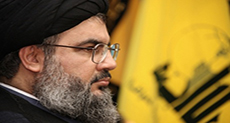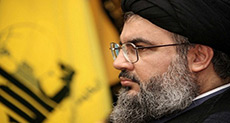Chomsky: "Hizbullah is a Lebanese phenomenon and the resistance should keep their weapons"

Source: Daily Star, 19-5-2006
By Jim Quilty
BEIRUT: "It`s never a gift. You don`t get gifts from the powerful. They`re won." It`s another post-lecture question period and someone`s asked Noam Chomsky if there`s any hope for social justice. "... We`re in a better position now than ever before to carry this forward because a lot of freedom has been won. It`s mostly a problem of will, not opportunity."
Chomsky`s Beirut visit attracted a bit more press attention than most field researchers get. This reflects the MIT linguistics professor`s stature as America`s best-known dissident. He did give a linguistics lecture, but it was in his capacity as policy critic that he gave two talks, interviewed several of the country`s political leaders and ruffled a feather or two.
The feather-ruffling came when he was asked to opine upon matters central to Lebanon`s present national dialogue. After interviewing Hizbullah Secretary General Hassan Nasrallah, Chomsky`s told the press the resistance should keep their weapons.
"In an ideal situation all militias should be disarmed," he told The Daily Star. "Unfortunately Lebanon isn`t Luxembourg. Since 1978 there have been four invasions from "Israel" - meaning a U.S.-"Israeli" invasion since "Israel" can`t invade with out U.S. permission - and plenty of bombings and other terrorism. That happens to be where Lebanon is.
"There`s only one deterrent to another U.S.-"Israeli" attack and that`s the threat of guerrilla warfare. If anybody can think of a better alternative I`d be happy to hear it. It`d be nice if the Lebanese Army offered a deterrent but it doesn`t.
"There is an alternative, namely a credible international agreement to prevent aggression. But who would guarantee it? The EU cannot and will not.
"Two years ago the EU and Iran made an agreement that Tehran would suspend uranium enrichment if the EU provided firm guarantees on security issues - that is U.S.-"Israeli" threats. The EU backed down under U.S. pressure, as it always does. Then Iran backed away from the agreement.
"The EU was unwilling to provide Iran any credible guarantee against aggression. How are they going to do it for Lebanon? So it comes back to the U.S., which accepts no international rules.
"If the U.S. and "Israel" decide ... there`s a group here that supports Hamas, say. In that reality Lebanon has two choices: either eliminate any deterrent to another "Israeli"-U.S. invasion or else have the credible threat of guerrilla warfare which is what drove "Israel" out in the first place."
Chomsky characterizes his critique of U.S. policy as straightforward institutional analysis. States act on interests, not friendship. "People in Lebanon who think that John Bolton wanted Syria out of Lebanon because he likes the Lebanese are dreaming," he says, a view contrary to local narratives of last spring`s "Cedar Revolution".
"I`d say maybe 10 percent of Americans know where Lebanon is," Chomsky said after one Beirut talk. "Maybe 15 percent of [policy] planners know.
"I don`t think there is much of a policy aside from `stay quiet and obedient.` Recently the U.S. has pressured Syria to get out of Lebanon but that was because they were interested in Syria, not Lebanon ..."
"When it came to ["Israel`s" 1982 Lebanon invasion] the U.S. had a policy: they supported it. When that became an embarrassment on the international scene, they changed policy and called it off and tried to settle it their own way. As long as Lebanon remains more or less orderly and it`s not harming any major U.S. interests there probably is no policy, at least none that I can think of."
Given Hizbullah`s rhetoric against "Israel" - and the fact that the disarming of all militias (aka Hizbullah`s military wing) was appended to UN Security Council Resolution 1559 - one would think the Party of God is the exception to the rule of U.S. indifference.
"America and Jordan talk about `the Shiite Crescent` but Hizbullah is irrelevant to that," Chomsky says. "Hizbullah doesn`t have any oil. It`s a Lebanese phenomenon. It won its position primarily by driving the "Israelis" out. It has its own interests and its own concerns - which it`s up to Lebanon to figure out.
"If Hizbullah were to accept U.S. policies, they could run Lebanon as far as the U.S. cares. Is Hizbullah a more extreme fundamentalist organization than the people who run Saudi Arabia?
"In fact, the U.S. has always strongly supported Islamic fundamentalism. It created the jihadis after all, in the 1980s. It supported Zia al-Huq when he was turning Pakistan into an Islamic fundamentalist state. The Reagan administration pretended that Pakistan wasn`t developing nuclear weapons.
"It`s just not an issue. The U.S. is ecumenical."
Chomsky compares U.S. animosity toward Syria to that of Slobodan Milosevic`s Serbia - "bombed because it hadn`t adopted the neo-liberal framework as the rest of Europe.
"Syria [is] the one part of the Middle East that`s not following orders. If Bashar Assad`s regime starts following orders, everything will be fine. (U.S. Secretary of State) Condoleezza Rice will visit. Everyone will kiss each other. He can be as brutal as he likes inside Syria."
Chomsky has been a strident critic of what he calls "the great moral and intellectual crisis of Western culture" - particularly the dearth of critical discussion among American intellectuals of U.S. foreign policy in the wake of September 11, 2001.
The "righting" of U.S. intellectuals reverberated locally, where in the years before the Iraq invasion some intellectuals (Lebanese and otherwise), once vaguely critical of America`s Middle East policy, supported neo-con interventionism. Some argued that society had to be rid of intelligence agents and police repression before civil protest was possible. Regime change was the best way to make civil action possible.
Chomsky has little time for opportunism, but acknowledges, "it`s often correct to take an opportunistic position. When I go to lobby Congress it`s opportunistic because I don`t trust them. But sometimes it`s the right decision.
"The leading nationalist figure in Indonesia, Sukarno, supported the Japanese all the way through the Second World War. It was totally opportunistic. They wanted the Japanese to drive the white man out of Asia so they were willing to make a pact with the devil. You can argue whether it was right or wrong, but you can understand the reasons for it.
"In the real world you have to make tactical compromises. You should do it with no illusions. Sukarno had no illusions about Japan`s goals about bringing an earthy paradise to Asia. But if the choice is one of supporting either the Japanese or Dutch imperialists, I think it`s the right choice.
"If the choice here is either to support John Bolton or to support Syria, perhaps the right choice is to support Bolton, knowing perfectly well it`s total cynicism."
Chomsky followed last Spring`s "Independence Uprising" and is aware many activists felt betrayed by their political leadership, but he resists dispensing advice.
"People shouldn`t be surprised to be betrayed by the political class," he says. "It`s in the nature of the political class, any power grouping for that matter."
"I keep away from [giving advice] for a very simple reason. I`ve been involved in resistance for over 40 years and these are hard questions. You have to make tactical decisions that judge the existing circumstances, like `Shall we undertake civil disobedience?` `Shall be lobby Congress?` `Shall we give talks?`
"I`ve been involved in all of them. I`ve been in jail plenty of times. It`s hard enough for me to make these decisions in Boston. I can`t do it here. I don`t understand the circumstances. People here have to work these problems out.
"People call them tactical questions, which make them sound insignificant, but the tactical questions are the hardest and the most important. They can only be made by people on the ground.
"People who look for help from the outside world are misleading themselves. There are no magic keys, no special techniques. If there were, someone would have told us centuries ago.
"It`s always the same methods - understanding, organization and appropriate action. You just have to decide what`s appropriate, on the basis of careful, close analysis.
"It`s like allowing guerrillas to function in the South. You have to have to judge the real circumstances. In the real world, not some imagined world that we`d like to live in."
By Jim Quilty
BEIRUT: "It`s never a gift. You don`t get gifts from the powerful. They`re won." It`s another post-lecture question period and someone`s asked Noam Chomsky if there`s any hope for social justice. "... We`re in a better position now than ever before to carry this forward because a lot of freedom has been won. It`s mostly a problem of will, not opportunity."
Chomsky`s Beirut visit attracted a bit more press attention than most field researchers get. This reflects the MIT linguistics professor`s stature as America`s best-known dissident. He did give a linguistics lecture, but it was in his capacity as policy critic that he gave two talks, interviewed several of the country`s political leaders and ruffled a feather or two.
The feather-ruffling came when he was asked to opine upon matters central to Lebanon`s present national dialogue. After interviewing Hizbullah Secretary General Hassan Nasrallah, Chomsky`s told the press the resistance should keep their weapons.
"In an ideal situation all militias should be disarmed," he told The Daily Star. "Unfortunately Lebanon isn`t Luxembourg. Since 1978 there have been four invasions from "Israel" - meaning a U.S.-"Israeli" invasion since "Israel" can`t invade with out U.S. permission - and plenty of bombings and other terrorism. That happens to be where Lebanon is.
"There`s only one deterrent to another U.S.-"Israeli" attack and that`s the threat of guerrilla warfare. If anybody can think of a better alternative I`d be happy to hear it. It`d be nice if the Lebanese Army offered a deterrent but it doesn`t.
"There is an alternative, namely a credible international agreement to prevent aggression. But who would guarantee it? The EU cannot and will not.
"Two years ago the EU and Iran made an agreement that Tehran would suspend uranium enrichment if the EU provided firm guarantees on security issues - that is U.S.-"Israeli" threats. The EU backed down under U.S. pressure, as it always does. Then Iran backed away from the agreement.
"The EU was unwilling to provide Iran any credible guarantee against aggression. How are they going to do it for Lebanon? So it comes back to the U.S., which accepts no international rules.
"If the U.S. and "Israel" decide ... there`s a group here that supports Hamas, say. In that reality Lebanon has two choices: either eliminate any deterrent to another "Israeli"-U.S. invasion or else have the credible threat of guerrilla warfare which is what drove "Israel" out in the first place."
Chomsky characterizes his critique of U.S. policy as straightforward institutional analysis. States act on interests, not friendship. "People in Lebanon who think that John Bolton wanted Syria out of Lebanon because he likes the Lebanese are dreaming," he says, a view contrary to local narratives of last spring`s "Cedar Revolution".
"I`d say maybe 10 percent of Americans know where Lebanon is," Chomsky said after one Beirut talk. "Maybe 15 percent of [policy] planners know.
"I don`t think there is much of a policy aside from `stay quiet and obedient.` Recently the U.S. has pressured Syria to get out of Lebanon but that was because they were interested in Syria, not Lebanon ..."
"When it came to ["Israel`s" 1982 Lebanon invasion] the U.S. had a policy: they supported it. When that became an embarrassment on the international scene, they changed policy and called it off and tried to settle it their own way. As long as Lebanon remains more or less orderly and it`s not harming any major U.S. interests there probably is no policy, at least none that I can think of."
Given Hizbullah`s rhetoric against "Israel" - and the fact that the disarming of all militias (aka Hizbullah`s military wing) was appended to UN Security Council Resolution 1559 - one would think the Party of God is the exception to the rule of U.S. indifference.
"America and Jordan talk about `the Shiite Crescent` but Hizbullah is irrelevant to that," Chomsky says. "Hizbullah doesn`t have any oil. It`s a Lebanese phenomenon. It won its position primarily by driving the "Israelis" out. It has its own interests and its own concerns - which it`s up to Lebanon to figure out.
"If Hizbullah were to accept U.S. policies, they could run Lebanon as far as the U.S. cares. Is Hizbullah a more extreme fundamentalist organization than the people who run Saudi Arabia?
"In fact, the U.S. has always strongly supported Islamic fundamentalism. It created the jihadis after all, in the 1980s. It supported Zia al-Huq when he was turning Pakistan into an Islamic fundamentalist state. The Reagan administration pretended that Pakistan wasn`t developing nuclear weapons.
"It`s just not an issue. The U.S. is ecumenical."
Chomsky compares U.S. animosity toward Syria to that of Slobodan Milosevic`s Serbia - "bombed because it hadn`t adopted the neo-liberal framework as the rest of Europe.
"Syria [is] the one part of the Middle East that`s not following orders. If Bashar Assad`s regime starts following orders, everything will be fine. (U.S. Secretary of State) Condoleezza Rice will visit. Everyone will kiss each other. He can be as brutal as he likes inside Syria."
Chomsky has been a strident critic of what he calls "the great moral and intellectual crisis of Western culture" - particularly the dearth of critical discussion among American intellectuals of U.S. foreign policy in the wake of September 11, 2001.
The "righting" of U.S. intellectuals reverberated locally, where in the years before the Iraq invasion some intellectuals (Lebanese and otherwise), once vaguely critical of America`s Middle East policy, supported neo-con interventionism. Some argued that society had to be rid of intelligence agents and police repression before civil protest was possible. Regime change was the best way to make civil action possible.
Chomsky has little time for opportunism, but acknowledges, "it`s often correct to take an opportunistic position. When I go to lobby Congress it`s opportunistic because I don`t trust them. But sometimes it`s the right decision.
"The leading nationalist figure in Indonesia, Sukarno, supported the Japanese all the way through the Second World War. It was totally opportunistic. They wanted the Japanese to drive the white man out of Asia so they were willing to make a pact with the devil. You can argue whether it was right or wrong, but you can understand the reasons for it.
"In the real world you have to make tactical compromises. You should do it with no illusions. Sukarno had no illusions about Japan`s goals about bringing an earthy paradise to Asia. But if the choice is one of supporting either the Japanese or Dutch imperialists, I think it`s the right choice.
"If the choice here is either to support John Bolton or to support Syria, perhaps the right choice is to support Bolton, knowing perfectly well it`s total cynicism."
Chomsky followed last Spring`s "Independence Uprising" and is aware many activists felt betrayed by their political leadership, but he resists dispensing advice.
"People shouldn`t be surprised to be betrayed by the political class," he says. "It`s in the nature of the political class, any power grouping for that matter."
"I keep away from [giving advice] for a very simple reason. I`ve been involved in resistance for over 40 years and these are hard questions. You have to make tactical decisions that judge the existing circumstances, like `Shall we undertake civil disobedience?` `Shall be lobby Congress?` `Shall we give talks?`
"I`ve been involved in all of them. I`ve been in jail plenty of times. It`s hard enough for me to make these decisions in Boston. I can`t do it here. I don`t understand the circumstances. People here have to work these problems out.
"People call them tactical questions, which make them sound insignificant, but the tactical questions are the hardest and the most important. They can only be made by people on the ground.
"People who look for help from the outside world are misleading themselves. There are no magic keys, no special techniques. If there were, someone would have told us centuries ago.
"It`s always the same methods - understanding, organization and appropriate action. You just have to decide what`s appropriate, on the basis of careful, close analysis.
"It`s like allowing guerrillas to function in the South. You have to have to judge the real circumstances. In the real world, not some imagined world that we`d like to live in."




